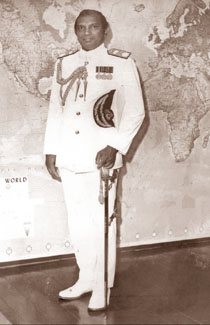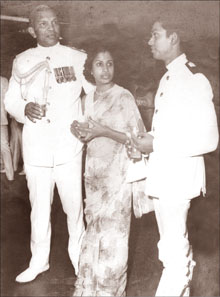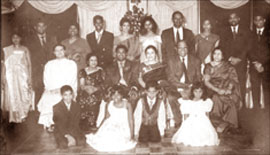|
Exemplary military leaders of Sri Lanka: Basil Gunasekara: First post-war Commander of the NavyCHARISMATIC: The pride and glamour of good old days still revolves at the residence of veteran sailor Deshamanya Admiral Basil Gunasekara, the first post-war Commander of the Sri Lanka Navy. A wall full of crests belonging to various war ships and mega size framed photographs of memorable events during his tenure from 1973 to 1979 as the Commander of the Navy made me to feel that I was entering the Captain's cabin of a Naval vessel anchored off Wellawatta.
"I was a senior Cadet at Royal College and I always liked to join a disciplined service and wear a uniform" was his quick answer when I asked what made him to join the Navy... "Director of Police Training, DIG Sydney Soysa who happened to be the Rugby coach of Royal College interviewed me one day on the playing field of Royal and selected me almost there as a Sub-Inspector of Police. But after one and half years in the Police an advertisement appeared in the papers for Direct Entry Sub Lieutenants in the Navy with training in the United Kingdom which attracted me and I applied. In 1950 I was selected and proceeded to the Royal Naval College, Greenwich in UK along with two other officers," elaborating on the beginning of his proud career he said. Basil was born on the 7th of May in 1929 in Katana as the youngest in a family of five - with two sisters and two brothers. His father was a Coconut Planter at Andiambalama and mother a housewife. It was at Mahinda College, Galle that he had his primary education before coming to Royal College Colombo to do his Advanced Level. He was also a champion athlete and played Cricket at Royal College. The training in the UK was followed by several technical courses in Portsmouth and Plymouth. On completion the three officers returned to Sri Lanka for a short period and thereafter were attached to the Flag Ship of the Royal Navy East Indies Fleet to obtain the Watch Keeping Certificate on Board H.M.S. Newfoundland".
"On completion of sea training I returned to the Sri Lanka Navy, which at the time was comparatively small and commanded by senior officers of the Royal Navy. This position remained till 1959 when for the first time a Sri Lankan Officer - Admiral Royce de Mel took command of the Navy. Admiral de Mel had been trained and had served with the Royal Navy during the 2nd World War" he said. As a young Naval officer Basil Gunasekara served in all the Naval establishments that existed at the time. His first appointment was as the training officer of the Naval Training Establishment in Diyatalawa. This institution was shifted to the Naval Dock Yard Trincomallee in 1959, after the British handed over the Naval Base to the Sri Lanka Government. The first command he received in 1955 as the Commanding Officer of a small base at Talai Mannar. "The strength of the base was two officers and 40 sailors. This base served as an Illicit Immigration (II) establishment and a communication centre. We had about 5-14 Dinghys with Out-Board Motors to patrol the coastal waters. These boats were not capable of operating in Monsoon conditions, so were the operators of the II boats. We did not even carry small arms in our boats as there was absolutely no necessity to do so, at that time" revealing the peaceful memories of the past he said.
During the 1958 communal riots he was sent to command the Naval Establishment in Trincomalee. (Sri Lanka Naval Ship) SLNS Tissa, which had about five officers and 300 sailors at the time, which is the home of the Sri Lanka Naval Fleet. On completion of two years in Trincomalee he was selected to undergo a specialised one year training on Under Water Warfare and Anti Submarine warfare - HMS Osprey in Portland UK. Then he returned to Sri Lanka Navy and served in more senior positions, both afloat and ashore. In 1963 he was selected to undergo the Staff College Course in Wellignton India. From 1964 to 1970 he held staff appointments at Naval Headquarters and also commanded the larger establishments in Colombo and Jaffna. In 1970 he was appointed Commander of the Flag Ship SLNS Gajabahu and in 1971 as the Chief of Staff, SLN. He was the first officer from all three services selected to undergo the National Defence College Course in New Delhi in 1972. Since then all three services have been regularly sending very senior officers to follow this course. Recollecting the "D Day" of his career he said "I was appointed Commander of the Sri Lanka Navy in 1973 and served for a total of six years respectively four and two during the times of Prime Minister Sirimavo Bandaranaike and President J.R. Jayewardene. "Six days after I took-over command of the Navy, the Naval contingent stationed in Polonnaruwa over some misunderstanding with the Police, attacked the Police Station at night causing serious damages to the station and severe injury to a few Policemen, one of whom died later-on. Mrs. Bandaranaike, then Prime Minister, ordered me to go to Polonnaruwa personally along with the DIG of the area who was then stationed in Colombo and make inquiries and report to her. The Police officer on seeing me in Naval uniform was at first quite hostile naturally. But I explained to them I had been sent by the Prime Minister to do an impartial inquiry, and they were then subdued, and helped me with my duty. I submitted my report to the Prime Minister in which I stated that the Naval contingent in Polonnaruwa were totally responsible. This resulted in criminal proceedings against several naval personnel and one officer and two sailors were convicted and sentenced to one and half years in jail. The then IGP Stanely Tilakaratne was fully satisfied with the inquiry. However, several sailors petitioned the Prime Minister that I did not listen to the version of 200 Sinhala sailors but accepted the version of one Tamil officer. Then the Prime Minister Sirimavo Bandaranaike summoned me and questioned me. I said, "Madam, you wanted an impartial inquiry done, I did so and found that I could believe the one Tamil officer and not the 200. She was quite satisfied and had no further questions," he said. "In another occasion in 1970 when we were patrolling in the Gulf of Mannar I as the Commander of SLNS Gajabahu. Our 14-day patrolling was extended by another seven days and we ran out of water. I had to restrict bathing for 300 crewmembers. Officers and Sailors came to me and requested permission to bathe in the deep sea where we could not even anchor the ship. I granted permission only for strong swimmers to bathe, which the ship stopped and drifted. And I was watching while they were bathing. Suddenly a young sailor of 21 who was a Tamil while swimming suddenly drowned in the sea in front of my eyes. We never found his body. I requested the Commander to get his parents down to the ship. When they came I showed them how it happened and they realised the truth and were satisfied. So it did not create any problem," he said. "In 1979 at the end of my period as the Commander, 15 LTTE leaders were arrested and then President J.R. Jayewardene called me and asked me to take them over. He was worried that the Army would kill them. I put them in my official room at Welisara and I personally talked to them. They were very docile. When I asked why they are against Sinhalese they said they had nothing against Sinhalese. But did not speak very much. Most of them spoke good English. Later I handed them over to Police. When looking at today's scenario in the country Admiral Gunasekara's charismatic character teaches us many lessons not to be injustice, partial and racist which has created hatred, division and suspicion among people. He always steered ahead in his course no alteration to port or starboard. Although there was no war at that time he was able to maintain the highest standard and quality of the Navy. Present Commander of the Navy, Admiral Wasantha Karannagoda was one of his Flag Lieutenants during his tenure in command and it is for the first time in the Naval history that an officer who held that appointment has become the Commander. Admiral Karannagoda said that he was inspired by the quality of Admiral Gunasekara where he got the opportunity to work very closely with him as his Flag Officer. "He never listened to tale carriers and whenever somebody came out with such stories he summoned both parties and settled the matter then and there. He was straightforward and very strict to those who tried to play out and he never left room to any form of corruption in the Navy" Admiral Karannagoda said. "In 1978 there was a cyclone in the country. We were coming together from Batticaloa to Colombo by road in the midnight. On the way the Commander observed that the driver was feeling sleepy and he asked him to go to the back seat and sleep. Then he drove the vehicle with me in the front seat," appreciating his humane qualities Admiral Karannagoda said. Admiral Gunasekara retired from the Navy in 1979 and joined the private sector for few years. He was the General Manager of Ceylon Match Company for 12 years and Chairman State Development and Construction Corporation for seven years. He served as a member on a Presidential Committee to approve of purchase to Armed Forces for two years and this committee was able to save Rs. 2500 million by disapproving unsuitable equipment during this period. He was awarded Deshamanya by the President for his services rendered to the country. At present he is the President of the Association of Flag rank Officers (ARFRO). He married Clara Nagahawatte, a daughter of an Ex-Mayor of Galle, E.D. Nagahawatta in 1953 and they have four children - Sriyanga Piyal, Kapila and Ranil who are well established. It was significant that his eldest son Piyal joined the Navy when he was the Commander of the Sri Lanka Navy and his son also retired after serving for 20 years. Admiral and Mrs. Gunasekara are proud grand parents of seven grand children. Questioned about the present situation in the country he said: "It was not nipped in the bud, so has developed into today's unfortunate situation." Those days when we played cricket six players were Tamil and five were Sinhalese. But there was no problem" His vision reminded me the famous proverb of Francis Becon "IF WE DO NOT MAINTAIN JUSTICE JUSTICE WILL NOT MAINTAIN US" |
|||
|
.................................. |











